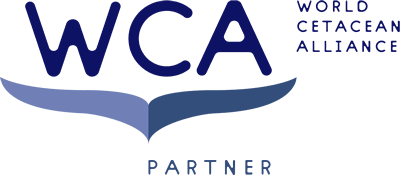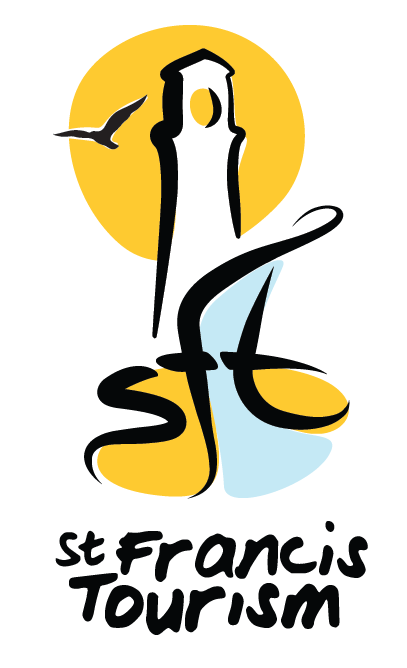Live Shark Project
STEP 1
DEAD or ALIVE!
Shark Eco-Tourism – a sustainable use of our natural resources
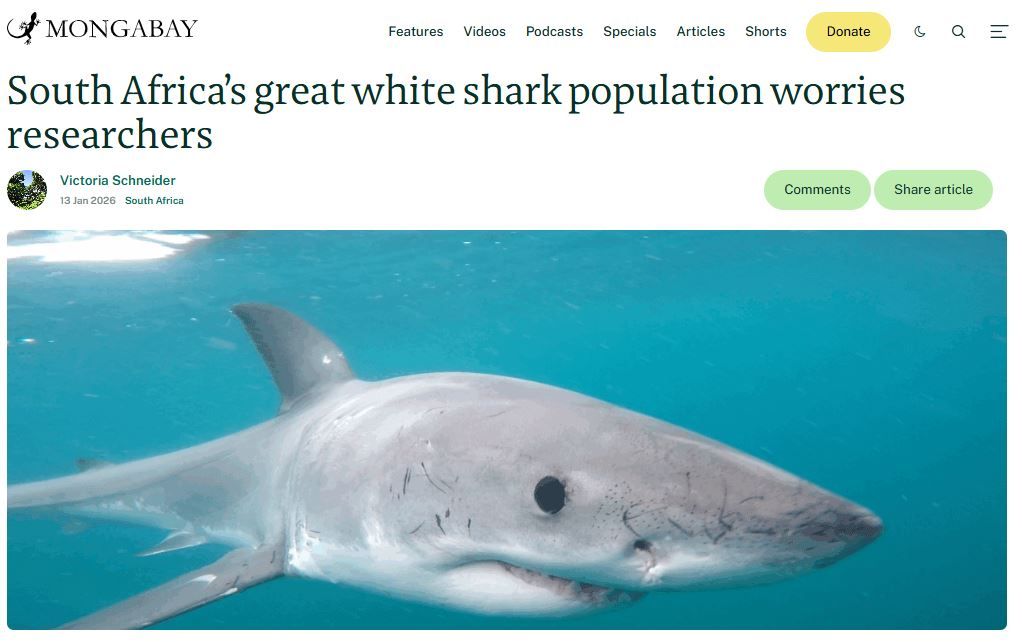
Read the Article
NOVEMBER 2025 The Shark Long Liners
They are at it again, as our beautiful sharks end up in shark fin soup in the east, and flake and chips at fast food outlets in Australia. How long is our newly appointed Minister of the Department of Environment Forestry and Fisheries (DFFE) going to allow this senseless slaughter to continue? This latest chain of events is a call to arms, to all of those who care about the health of our oceans.
The attached images are of the Shark Long Liner, Zanette, loading off it’s catch of critically endangered Soup fin and endangered Smooth hound sharks at Port Elizabeth. This same industry recently received a R5 million fine for illegally fishing in our flagship Marine Protected Area of De Hoop. After this, why are they still allowed to operate?
Recently, this same vessel seen in the photos, was caught engaging in further illegal fishing activity. They were fined R2 500 for the following. Removing head and tail of sharks while still at sea. Catching and killing undersized and oversized sharks. Not putting up their birds scaring lines properly. Birds take the bait and get dragged under water and drown. Catching and killing boney fish. Not giving the authorities 24 hours’ notice before entering port with the said fish.
Also, there is a camera on the above boat, Zanette which is supposed to be monitored by DFFE. Why did DFFE not pick up that all the above-mentioned permit conditions were being broken? It seems like this whole camera story is just an eye blind and has no purpose at all. Why are there no observers on this boat to keep an eye on proceedings?
They broke so many of their permit conditions in broad daylight. What else do they do when not in the public eye. A whistle blower recently revealed many horrific stories about what happens in this industry. The worst is that they were allowed to keep the illegal catch, which is worth so much more than the pathetic fine. This is an invitation to carry on doing it. What a joke!
According to the app, Global Fishing Watch, this boat has been tracked in many MPAs during the last two years. This is not to say they were fishing, but surely this should be monitored by DFFE? They should have this data on their system.
Over half of South Africa’s shark species are listed as data deficient. Should we not take a precautionary approach and not stop shark long lining until this can be researched?
Please could you bring this to the attention of your local DA councillors, members of the Provincial Legislature and National Government. The DA now have a Minister in charge of DFFE and he needs to be briefed on this industry that keeps on breaking it’s permit conditions. We gave Minister Dion George a full presentation on Ropeless Fishing in an attempt to stop the Rock Lobster Fishery using ropes that entangle whales. This leads to a slow and agonising death. The very whales that thousands of tourists are coming to see in South Africa. That request seems to have fallen on deaf ears; we cannot allow the same fate to befall our critically endangered sharks. Get moving!
BREAKING NEWS!
Last night, Soup fin and Smooth hound Sharks were added to the CITES list at a recent gathering, but the news will only be released next week. CITES stands for the Convention on International Trade in Endangered Species. It confirms that the import, export, or re-export of a specimen is legal and sustainable. In our case it is not sustainable, so the government needs to address this issue. Now is the time to act and start putting pressure on the Minister!
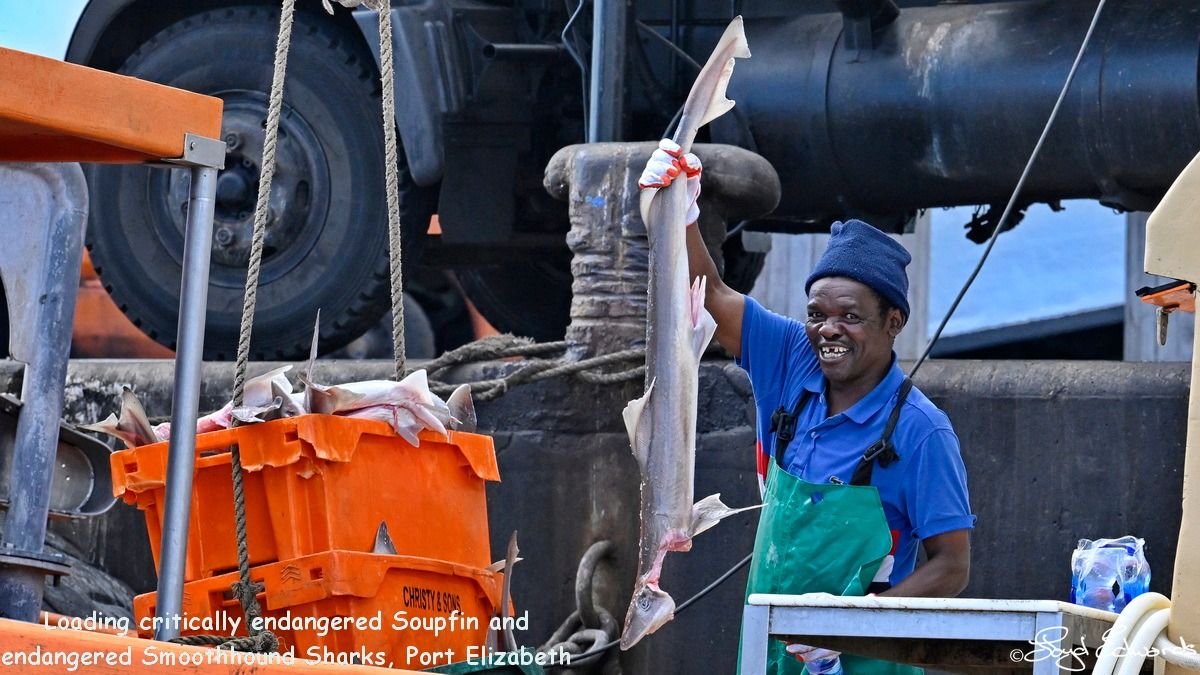
We managed to get this worker to hold up one of the sharks. Telling the difference between smooth hound and soup fin is not easy when they have been dead for a while.
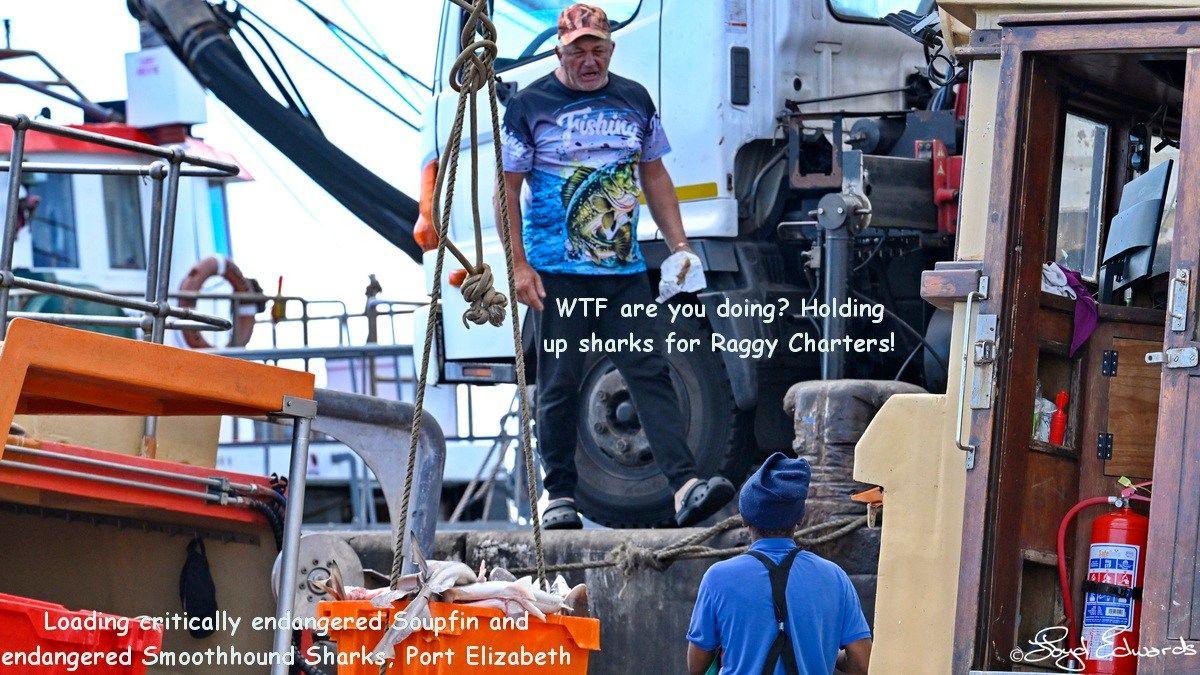
This supervisor had some choice words for the poor guy who held up the shark for us!
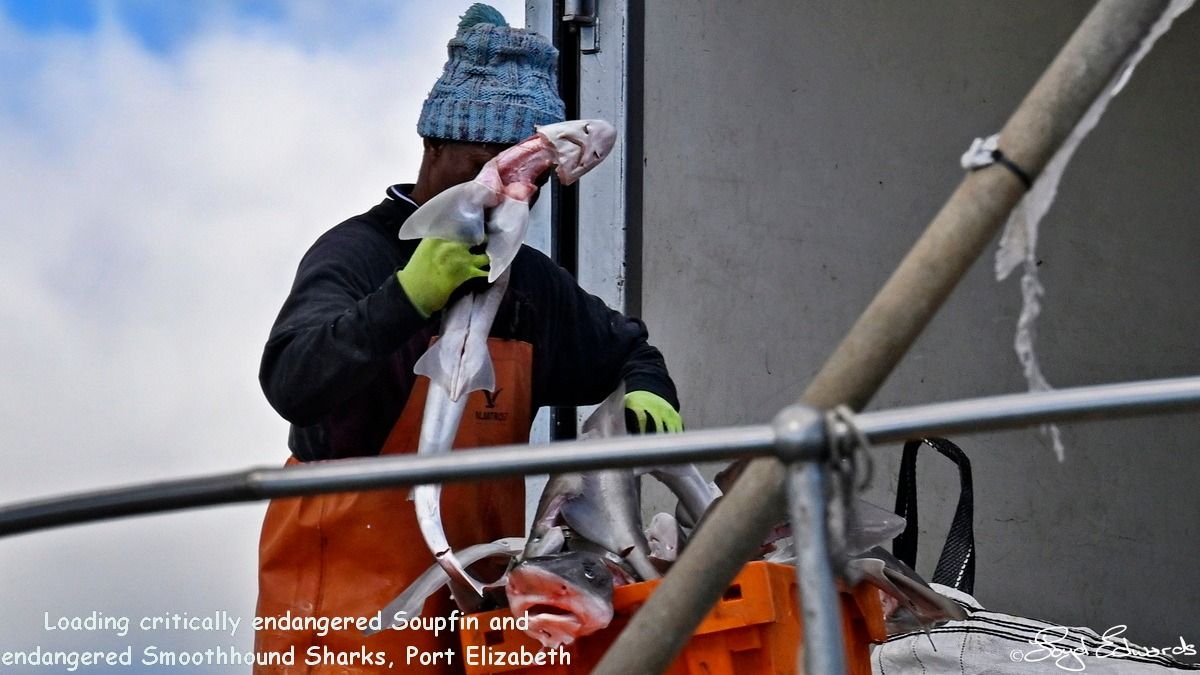
The expression on the shark in the bottom centre of the image says it all. How terribly sad.
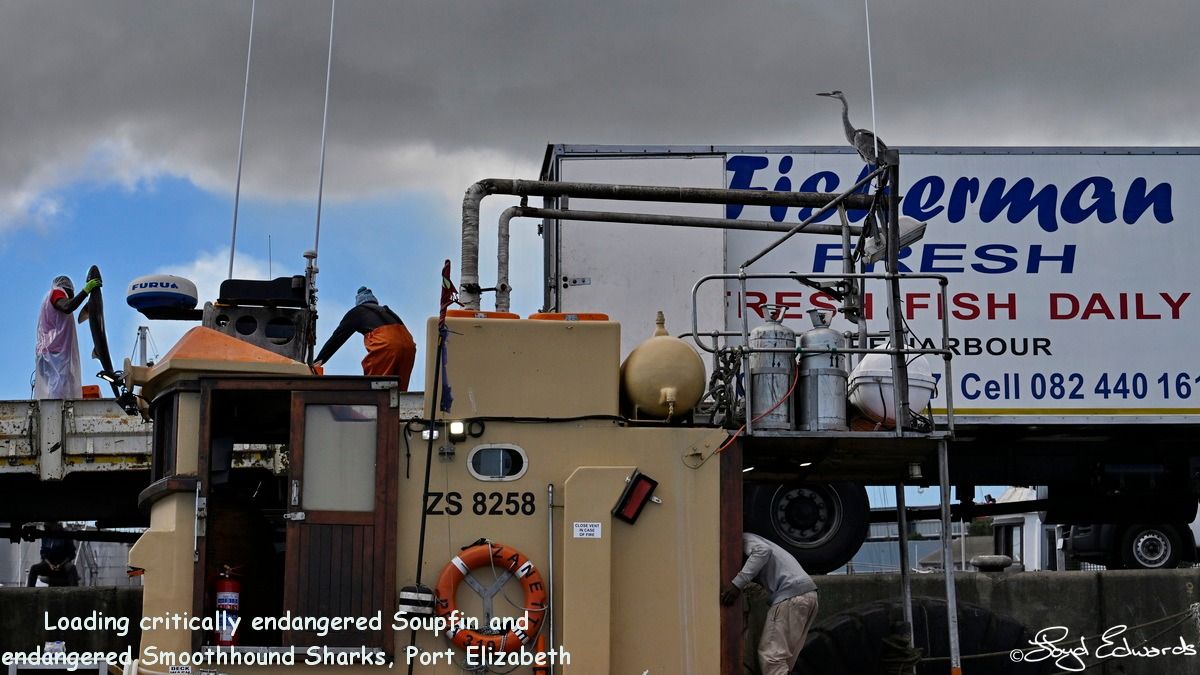
Although Fishermen Fresh are not the company that owns the shark long lining license, they do assist with the processing of the catch. They used to be one of the license holders.
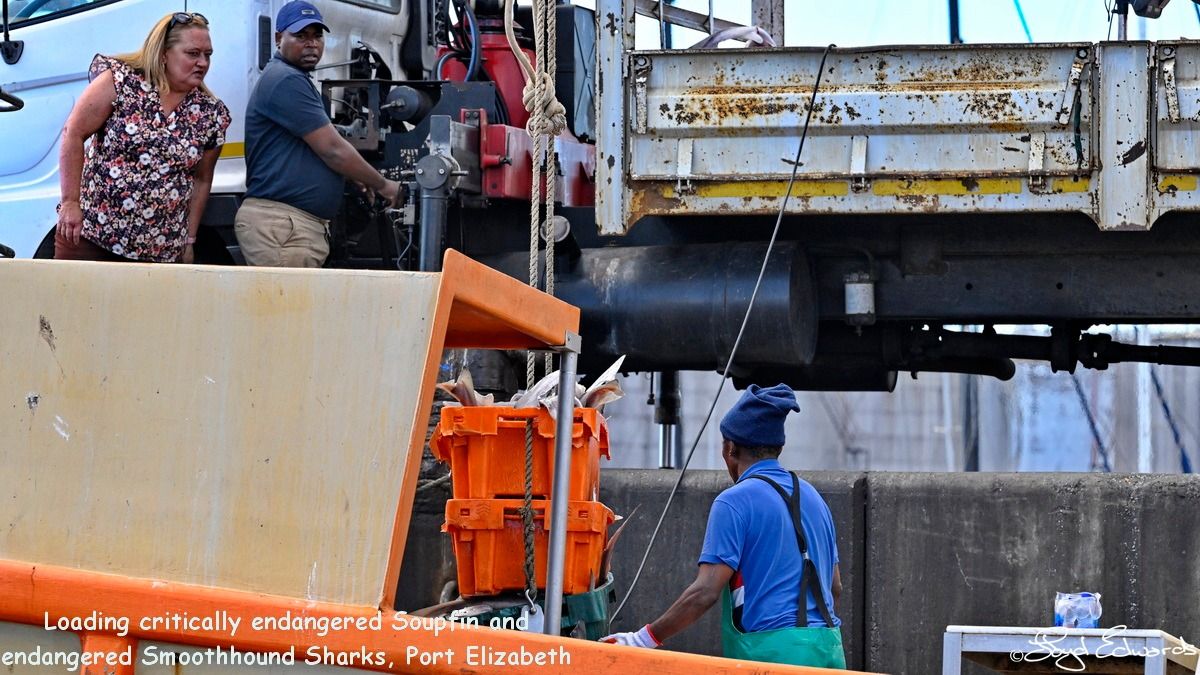
Crates of sharks get winched up from vessel Zanette onto a waiting vehicle.
UPDATE 23 JULY 2024: Read the Article

The point of the public meeting (that could not take place on 18 Mar 2020 due to the COVID 19 scare) is to enlighten the public about the
Consumptive use of sharks vs. the Non-Consumptive use
On the Consumptive side, there are 3 permitted demersal long line shark vessels operating out of Port Elizabeth along the South African coastline. Their main targets are smooth-hound and soupfin sharks, both which are classified as vulnerable. While the fins are exported to Asia, meat goes to Australia where it is eaten as "fish ‘n chips". At the same time Australia jealously guards their shark populations and not a single shark species may be caught. The scientists from the Department of Environment, Fisheries and Forestry have warned that the catch rate of smooth-hounds is three times the sustainable limit. However, during the last 10 years the government has not implemented upper catch limits, thus the plundering of our natural shark resources continues unabatedly. Raggy Charters has submitted a formal complaint to DEFF as it was alleged that a fishing vessel recently offloaded sharks in Mossel Bay without a DEFF inspector being present. This is in violation of the permit conditions. Added to this, the skipper and owner of the fishing vessel, “White Rose” have already appeared in court for fishing in a marine protected area (MPA). These vessels are very often fishing on the boundary of the MPA. Sharks are also caught as bycatch in other fishing industries and line fishermen have no limits on the number of sharks caught and killed. It is these small sharks that are targeted by the industry which make up the bulk of the diet of great white sharks. According to fisheries scientists, the lack of small sharks is the main reason for the disappearance of white sharks in the Western Cape over the last two years. As a result, the White Shark Cage Diving industry (WSCD) has collapsed along with all the spin offs this had for tourism and South Africa as a whole.
Why no outcry previously?
The reason there has not been a bigger public outcry is because sharks have had a bad rap in the past. Too little is known about their behaviour. They are seen as the terrible man eating monsters. In fact, last year 5 people were killed by sharks, compared to 800 by toasters and 1,2 million by vehicles! Humans kill 100 million sharks every year. Sharks are hugely important to the smooth functioning of the marine ecosystem and play a pivotal role. We need sharks! Seal predation by white sharks in False Bay is non-existent at present. This means an increase in the seal population and more pressure on our fish stocks. How do we change this perception about sharks?
Non-Consumptive use of Sharks
SCUBA divers have been diving with sharks for decades and are now starting to venture into diving more with ones considered dangerous to humans like white, tiger and Zambezi sharks. Due to the gradual awareness promoted by SCUBA diving companies, this has now become popular. Sardine run tours and their associated sharks have become a world renowned activity in South Africa. Take away sharks and you will destroy both of these industries.
The other big industry associated with non-consumptive use of sharks is WSCD. People from all over the world travel long distances to South Africa for this bucket list experience. For the last 20 years areas such as Gansbaai and Seal Island attracted thousands of tourists a year. During the last two years, however, the White Sharks have all but disappeared.
Two notorious killer whales, Port and Starboard have been blamed. But how coincidental is the disappearance of the white sharks with the increase in long-line shark fishing? During 2018 the vessels intensified their operations, catching twice as many sharks than the year before. In one year they doubled their catch volume to unsustainable amounts. Is the real reason why white sharks are vanishing from our water not exactly that? Our sharks are being depleted for fish and chips in Australia and shark fin soup for weddings in Hong Kong. For these short term goals, our white sharks are starving and we are at the edge of losing possibly the greatest of the Big 7 animals.
According to a study performed by Stellenbosch University marine biologist Sara Andreotti, there are less than 500 adult white sharks left in SA waters. Thus white sharks in SA are far closer to extinction than the black rhino, whose numbers are steadily increasing to 5500 in 2019. The white rhino now numbers 18000. How much time and energy and money are going into the protection of rhino, while none is afforded to white sharks.
When we launched the awarding of the rights for WSCD in Algoa Bay two years ago, it was met with mixed reactions. Remember that Boat Based Whale Watching also had opposition initially, as it was thought that it could chase whales away. How wrong were the proponents of that myth and look where that industry is today. There is a huge amount of work being done in protecting cetaceans globally.
The main point of contention about WSCD was the use of "chum" to lure the sharks. Remember that chum does not lure sharks to an area; it simply lures them a few metres closer to the vessel. The sharks are attracted to Black Rocks, near Bird Island in Algoa Bay (where Raggy Charters will be operating the WCSD) by the presence of seal pups that are learning to swim from April onwards. White shark research at Black Rocks was last carried out with the assistance of Raggy Charters vessels 10 years ago and nothing has been done since. There is a total lack of data and understanding of white sharks in our ecosystem. This would not have been the case if there was a WSCD operation on the go. At the previous public meeting, Lloyd asked those against chumming that if he found an alternative method to lure sharks closer without chum, would they support the operation? They agreed. After speaking to WSCD operators in Australia and New Zealand, he came across the playing of music underwater which seemed to attract the sharks. While the Australians used ACDC in their mix, here in South Africa we will explore the use of Johnny Clegg – local is lekker! Our operation is set to kick off in April 2020, provided we are not scuttled by the Covid19 Virus!
For Algoa Bay, WSCD is vital. Nelson Mandela Bay Tourism is positioning itself to attract eco-tourists to our bay. The Addo National Park is the only place on Earth to see the Big 7, the 5 land animals and whales and white sharks! People come here to experience our beautiful environment, our unique biodiversity and our once in a life time experiences. While they are here, they stay in our backpackers, hotels, lodges, they eat in restaurants, they use transport and they buy mementoes from sidewalks and shops. This is what WSCD can do for us. Should we not protect this vital asset that we have in Algoa Bay… and not let it vanish from our seas? WSCD will afford this opportunity.
What is Shark Cage Diving (WSCD)...Groups of people from all over the world travel to a few destinations for the opportunity to sight the rare White Shark. Shark Cage diving operations use relatively small boats capable of carrying anywhere between 12 to 50 passengers. In most cases this activity takes place close to a seal colony, with some exceptions being made for summer months when White sharks move inshore. A fish-based chum is used to draw sharks that are already in the area closer to the boat for people to observe and study. A large bait, usually a fish head is strategically tossed and maneuvered to entice sharks to swim past a cage which is attached to the boat and floating on the surface. Thus providing the occupants of the cage with a clear underwater view of the sharks. There are many people who are against shark cage diving. Some of the shared concerns are that sharks will be attracted to swimming beaches and learn to associate humans with food. The pictures provided illustrate the distance from such beaches to the seal colonies where the shark cage diving boats operate.
White Shark Cage Diving started in South Africa in 1989 in Gansbaai, Western Cape. The industry has now grown substantially with twelve operations now operating in three destinations, namely Gansbaai, Falsebay and Mossel Bay. WSCD is an economic boost to the areas, supporting spin off to accommodation providers, restaurants, retails and other attractions. Tourism for Shark Cage Diving in South Africa provides jobs for hundreds of people. There is one particular operation in South Africa that has 115 employees on their own.
Recently the Shark Cage Diving industry has suffered huge losses and has had to adapt to stay alive. The reason for this is that the sharks seemed to have simply disappeared. From 2010 to 2016 an average of 205 sharks were sighted each year. In 2018 this figure fell to just 50 individuals and then to 0 in 2019. This indicates that drastic action is required to protect our white and other shark species.
Please take the time to sign our petition against the poorly managed demersal long line shark fishing industry. Read the news coverage on the subject.
lIVE SHARK PROJECT STEP 2
We have got Government's Attention
A Step In The Right Direction For South Africa's Sharks!
On 22 May 2020, the International Day for Biodiversity, we received some excellent news.
Minister Barbara Creecy announced that she has appointed a 9-member panel to review the status of conservation and the degree of management over South Africa’s sharks species. This follows months of public pressure on demersal longline shark fishing, ranging from local and international newspaper articles, a Carte Blanche Flake&Chips expose, an outcry over illegal fishing in an MPA, and this Save Our Sharks Petition.
I thank you all… your commitment was not in vain, but now we hope that the panel heeds all of our call to stop demersal shark longlining. We need just 1000 more signatures to reach our petition goal, please sign and share. Our letter to DEFF is almost complete to be attached to the petition and submitted!
The shark panel will in effect review the National Plan of Action for the Conservation and Management of Sharks (NPOA-Sharks) that has been in place over the last 7 years. If we are to take a current snapshot of shark conservation in South Africa we have to conclude that this plan has failed dismally. Several shark species in South Africa have never before in our history been so endangered, so over-exploited and on such a steep slippery slope towards extinction than exactly now. How can Minister Creecy, the custodian for the protection of our environment and sustainable development, explain this to the International UN committee, IPOA-Sharks?
It is quite a coincidence that the news of a shark panel review reached us precisely on International Day of Biological Diversity! Loss of species and the subsequent ecosystem changes are the main environmental and ecological issues that we are facing today. We have to ask ourselves the question: can we afford to lose any of our shark species – the elegant smooth hound shark, the enigmatic hammerhead shark, or lo and behold the epic white shark? No, they need to be protected to ensure an effective ecosystem, for the present and future generations, as enshrined in our constitution. This is exactly why the panel review is so important.
The timing of the appointment of the shark review panel is perfect. During this time of the Covid-19 pandemic we are probed to reflect, to review, to take stock of our lives. This is exactly what we are asking from the panel… to reflect, to review, and to take stock of our shark populations in South Africa. We can no longer afford the luxury of more studies, of counting sharks, this has already been done. We just don’t have time.. unless we want to count them to the point of no return. We now need a creative, far-reaching approach that will fix the problems, provide solution and where governance and accountability are included.
This year we can ’flatten the curve’’ of our shark numbers that are hauled from our ocean. We can work together at all levels to build a better future around our natural shark heritage, both for fishing and ecotourism.
Today we are asking the panel to put drastic actions in place to conserve our shark species, to restore them to an effective population size. We need to stop shark fishing, create buffers around our MPA’s, pursue sustainable non-consumptive options and manage our shark populations in line with the rest of the world’s movement to protecting apex predators. It will mean a strong will for protecting South Africa’s biodiversity against political pressure for quick financial gains. I trust the panel is up for the challenge as this is a great opportunity to protect what is left.
Special thanks go to Ronelle Potgieter for her assistance.
Read: DEFF’s Media Release and the Herald article
lIVE SHARK PROJECT STEP 3
Presentation of letters and Petition to DEFF
8th June 2020 Raggy Charters, Nelson Mandela Bay Tourism and Algoa Bay Conservation present the Save Our Sharks petition to Minister Barbara Creecy at the Department of Environment, Forestry and Fisheries (DEFF).
The letters to Minister Creecy can be viewed or downloaded at:
07062020_save_our_sharks_petition_memorandum_to_deff.pdf
sos_information_for_npoasharks_review_panel_16062020_1.pdf
sos_letter_to_review_panel_npoa_16062020_1.pdf
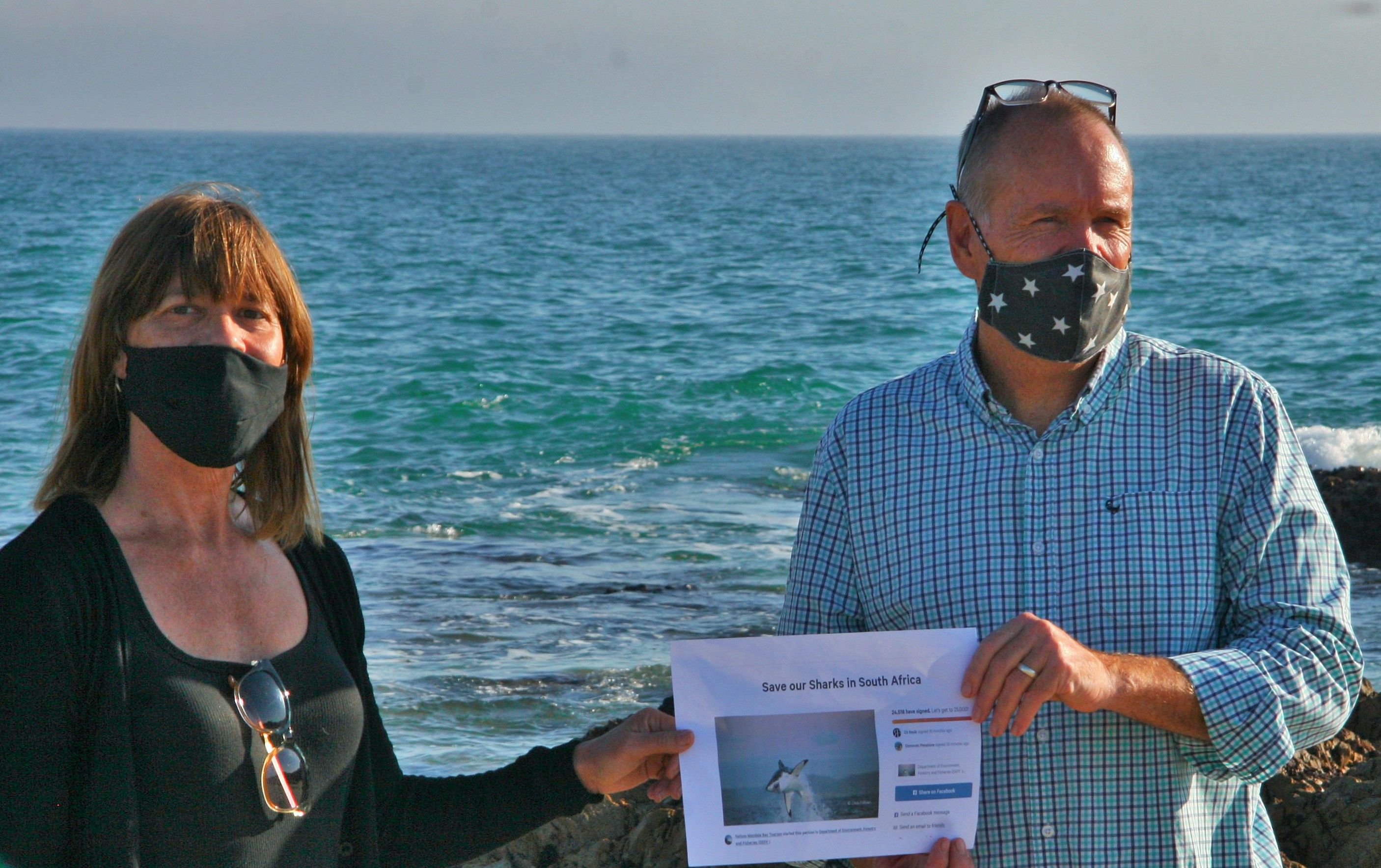

Publication in The Herald 19 November 2020

















